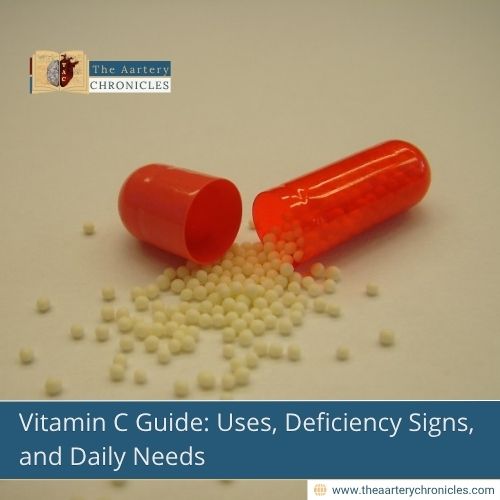

Vitamin C Guide: Uses, Deficiency Signs, and Daily Needs
Introduction
Vitamin C – also known as ascorbic acid – is one of the most popular and widely used vitamins, yet often misunderstood. It is famous for its role in strengthening the immune system, but its functions go far beyond preventing colds. It is a powerful antioxidant, participates in collagen production, facilitates iron absorption, and protects cells from oxidative stress.
Although the human body is unable to synthesize it, vitamin C is essential for our well-being and must be consumed daily through our diet.
What Is Vitamin C?
Vitamin C is a water-soluble compound that our body cannot store, so it is necessary to consume it regularly. It is involved in numerous biochemical reactions, and its deficiency can cause serious symptoms, such as scurvy.
The Main Benefits Of Vitamin C
Symptoms of cardiac asthma can develop suddenly and quickly become severe. The condition is often confused with bronchial asthma due to similar respiratory symptoms, but the underlying cause is related to the heart, not the bronchi. The main symptoms include:
1. Strengthens the immune system
- Increases the production of lymphocytes and phagocytes
- Stimulates the activity of natural killer (NK) cells
- Promotes wound healing
2. Powerful antioxidant
- Neutralizes free radicals
- Protects tissues from oxidative stress
- Reduces the risk of premature cellular aging
3. Helps iron absorption
- Improves the assimilation of non-heme iron (present in vegetables)
- Useful in cases of iron deficiency anemia or vegetarian/vegan diets
4. Contributes to collagen formation
- Essential for healthy skin, bones, cartilage, gums and blood vessels
- Promotes tissue regeneration and skin elasticity
5. Supports cognitive function
- Participates in the synthesis of neurotransmitters (dopamine, noradrenaline)
- It has a protective effect on the brain thanks to its antioxidant action
Recommended Daily Requirement
Age Range / Condition | Recommended Daily Allowance (RDA) |
Adults | 75–90 mg |
Pregnant women | 85 mg |
Breastfeeding women | 115 mg |
Smokers | +35 mg above the standard requirement |
Athletes or stressed subjects | Up to 200 mg (under medical supervision) |
The upper tolerable limit is 2000 mg/day (in healthy subjects), beyond which gastrointestinal disorders may appear.
Foods Rich In Vitamin C
Main natural sources:
- Acerola: up to 1677 mg per 100 g
- Rosehip: 426 mg
- Raw peppers: 166 mg
- Blackcurrant: 200 mg
- Fresh parsley: 150 mg
- Kiwi: 85 mg
- Strawberries: 59 mg
- Oranges and citrus fruits: 50–60 mg
- Broccoli, cauliflower, cabbage: 50–90 mg
Vitamin C is thermolabile: it degrades easily with prolonged cooking, light, and oxygen. It is therefore recommended to consume vegetables raw or lightly steamed.
Signs Of Vitamin C Deficiency
- Bleeding gums
- Chronic fatigue
- Dry and rough skin
- Joint pain
- Ease of infection
- Slow healing
- Scurvy (in severe cases)
Vitamin C Supplements: Are They Really Necessary?
Vitamin C supplements may be helpful for:
- Smoking and high environmental pollution
- Diet low in fruit and vegetables
- Intestinal malabsorption
- Intense physical exertion or chronic stress
- Ongoing infections
However, most people can cover their needs through diet, without resorting to supplements.
Curiosities About Vitamin C
- Primates, guinea pigs and some bats are among the only mammals unable to synthesize it autonomously.
- Linus Pauling, Nobel Prize winner, was among the first to support vitamin C as a prevention for colds and cancer (theories now partly debunked)
- In some plant species, vitamin C acts as a primary immune system against environmental stress
Conclusion
Vitamin C is a molecule essential to human health, involved in a variety of biological processes. Consuming it regularly, through a varied diet rich in fresh fruits and vegetables, is essential for supporting the immune system, counteracting cellular aging, and promoting overall health.
Knowing the secrets of vitamin C means learning to nourish your body better, starting with conscious and natural food choices.









